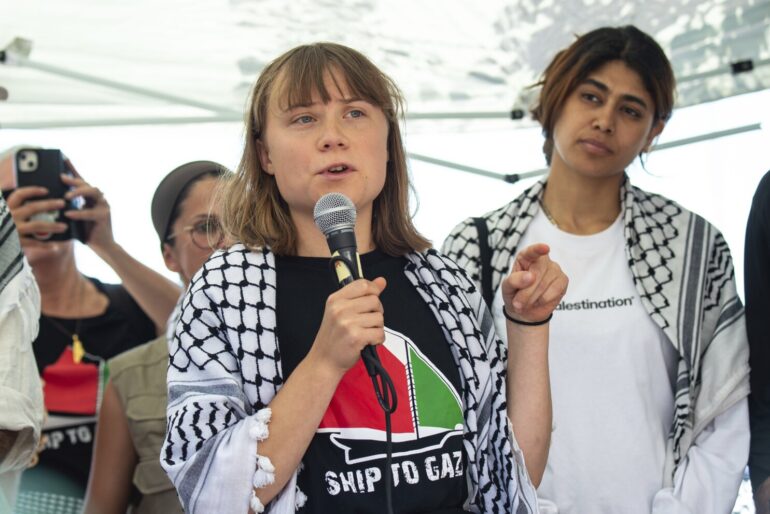On June 1, 2025, climate activist Greta Thunberg, alongside 11 other activists, set sail from Sicily aboard the Madleen, a vessel operated by the Freedom Flotilla Coalition. Their mission: to break Israel’s naval blockade of Gaza and deliver desperately needed humanitarian aid, including food and medicine, to a population reeling from a 20-month war. However, Israel’s Defense Minister Israel Katz has vowed to stop the boat “by any means necessary,” escalating tensions in an already volatile conflict.
The Madleen’s journey is not just about delivering supplies; it’s a bold statement against the humanitarian crisis in Gaza, where over 54,000 Palestinians have been killed, and 90% of the population has been displaced since the Hamas-led attack on southern Israel on October 7, 2023. That attack, which killed 1,200 people and saw 251 hostages taken, sparked Israel’s military campaign and a blockade that has severely restricted aid. Humanitarian workers warn of famine unless the blockade is lifted, with recent Israeli efforts to allow limited aid falling short of Gaza’s needs.
Thunberg, joined by activists like Rima Hassan, a French-Palestinian member of the European Parliament, and Thiago Ávila, a Brazilian activist, has faced significant risks. On Sunday, June 8, the Madleen was roughly 160 nautical miles from Gaza when its tracking and communication devices were reportedly jammed, briefly showing the boat’s location as Jordan. The crew is bracing for potential interception by Israeli forces, with a press officer stating they are “preparing for the possibility of confrontation.” A previous Freedom Flotilla attempt last month was thwarted when drones, allegedly from Israel, damaged another vessel in international waters off Malta.
Israel defends its blockade as a necessary measure to prevent Hamas from importing arms and to pressure the group into releasing the 55 hostages still held, many believed to be dead. Katz labeled the Madleen a “hate flotilla” and accused Thunberg and her fellow activists of being “Hamas propagandists,” warning them to turn back. “You will not reach Gaza,” he declared on social media, emphasizing Israel’s resolve to act “at sea, in the air, and on land.”
Thunberg, undeterred, framed the mission as a moral imperative. “We are doing this because, no matter what odds we are against, we have to keep trying,” she said last week. “The moment we stop trying is when we lose our humanity.” She condemned what she called a “live-streamed genocide,” a claim Israel vehemently rejects, insisting its actions target Hamas, not civilians.
The Madleen’s journey highlights the broader Israel-Palestine conflict, where blockades, imposed by Israel and Egypt since Hamas took control of Gaza in 2007, have been criticized as collective punishment for Gaza’s 2 million residents. The war’s toll—thousands of children among the dead, entire neighborhoods reduced to rubble—has intensified global calls for action. Yet, the Madleen’s fate remains uncertain, caught between Israel’s security measures and the activists’ determination to deliver aid.
As the vessel sails closer to Gaza’s waters, the world watches. Will Thunberg and her crew break through, or will Israel’s blockade hold firm? The outcome could ripple far beyond the shores of Gaza, shaping the narrative of a conflict that continues to divide and devastate.
